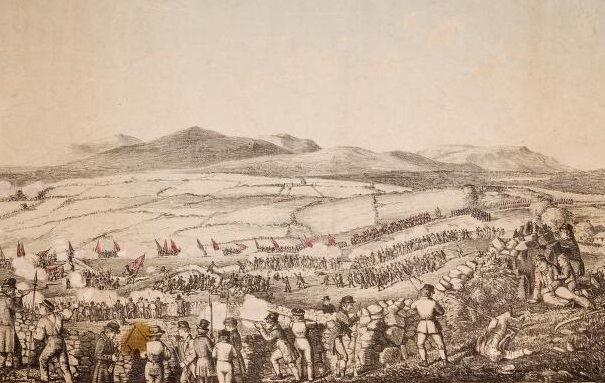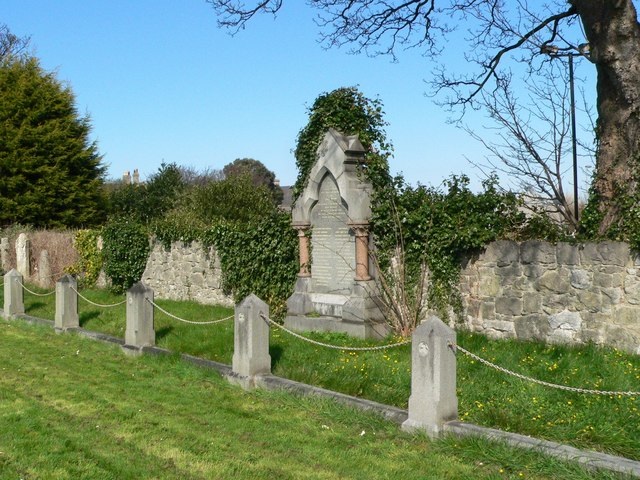Gift of the Gavel | The Man Behind Cork’s Berwick Fountain
The Berwick fountain on Cork’s Grand Parade is an iconic piece of street furniture on Leeside. The fountain was gifted to the city by (and named after) a Kildare man who died in a horrific accident 150 years ago.
Walter Berwick was born in Leixlip, County Kildare in 1800, the son of Reverend Edward Berwick, the Vicar of Leixlip. He was educated at Trinity College Dublin and Gray’s Inn. In 1826 Berwick was called to the bar and in 1840 he became Queens Counsel. Berwick then went on to become Bencher of Kings Inn in 1856.
On the 12th of July 1849 an Orange Order march at Dolly’s Brae in south Down descended into a riot which resulted in several deaths. It has gone down in history as The Battle of Dolly’s Brae which saw Orange men clash with Nationalists. Berwick chaired the inquest that followed and he was highly critical at the lack of law enforcement on the day. Berwick’s inquest resulted in the removal of three magistrates and the enactment of the Party Processions act of 1850 which prohibited open marching of sectarian organisations such as the Orange Order. However, the act was repealed in 1872.
During this time Berwick was made assistant barrister for east Cork, in effect making him a Judge of the county . His thorough fairness earned him the respect of the people of the rebel county and in 1859 when he was made Judge of the Irish Court of Bankruptcy in Dublin thousands of Cork people paid him a plethora of tributes. In return Berwick commissioned a fountain for the Grand Parade in Cork city “in remembrance of the great kindness shown to me by all classes in Cork.”

At a cost of £150, the Berwick fountain was designed by Sir John Benson and cut from limestone out of the Beaumont quarry. The man tasked with cutting the now iconic fountain was Patrick Scannell of Douglas Street and on New Years Day 1862 the Berwick Fountain was presented officially to the Lord Mayor John Arnott by Judge Berwick.
Berwick lived out his last years in Lucan, Dublin. His death occurred 150 years ago in August 1868 while returning from a holiday in Switzerland with his sister.
On the morning of August 20th 1868, Berwick and his sister Elizabeth Mary boarded the Irish Mail train at Euston Station, London. They were bound for Holyhead and the boat across the Irish sea for Dublin, thus completing their journey from Switzerland where they had been holidaying. At Euston Station the Berwick siblings took charge of a young girl called Louisa Symes who was a distant relative of theirs.
The train was going approximately 64 km/ph but it was running five minutes late. At Abergele on the north coast of Wales, a runaway wagon was hurtling down the track towards the Irish Mail train. Arthur Thomson, engine driver of the Irish Mail train, saw the runaway wagon speeding towards them and immediately shut off the steam while his fireman applied the brake but it was of little use. Thompson said to his fireman ” For God sake Joe jump! We can do no more.”
Thompson jumped, Joe did not and he perished along with 32 other people including the Berwicks and their young charge.
The Abergele Rail Disaster was deemed the worst rail accident in Britain at that time. The runaway wagon was carrying 50 barrels of paraffin oil and upon impact with the Irish Mail train it exploded. The first four carriages were completely incinerated by a fire ball and the victims were burned beyond recognition, including Berwick, his sister and young girl they were in charge of. All of the victims were buried in a mass grave in St Michael’s churchyard in Abergele while the funerals were paid for by London and North Western Railway.

The inquest which followed the Abergele Rail Disaster found that had the the Irish Mail been on time, not 5 minutes late, it would have avoided the runaway wagon but, the real blame was laid on the station master at Abergele and two brakesmen who were charged with manslaughter as they failed to control the runaway wagon.
Thompson who had jumped from the Irish Mail before impact injured himself badly and died two months after the accident. The brakesmen and station master were later acquitted of manslaughter.
Today the fountain Walter Berwick gifted to the people of Cork is a cherished part of the city. It has become a focal meeting point for people during the day and as night falls it attracts after-hours revellers, some of whom go gallivanting in the waters of the fountain and end up answering for their actions in court.
Now what would Judge Berwick think of that?
